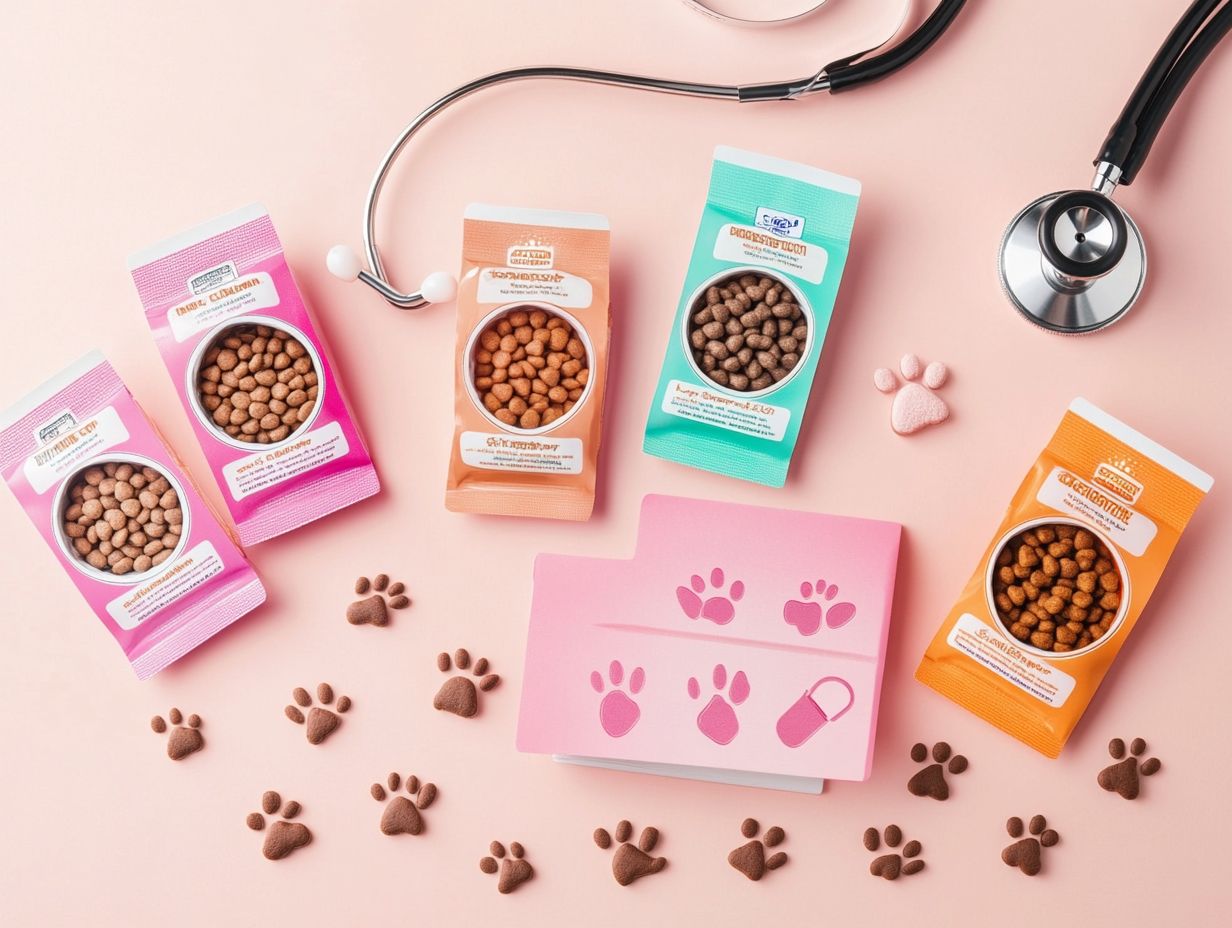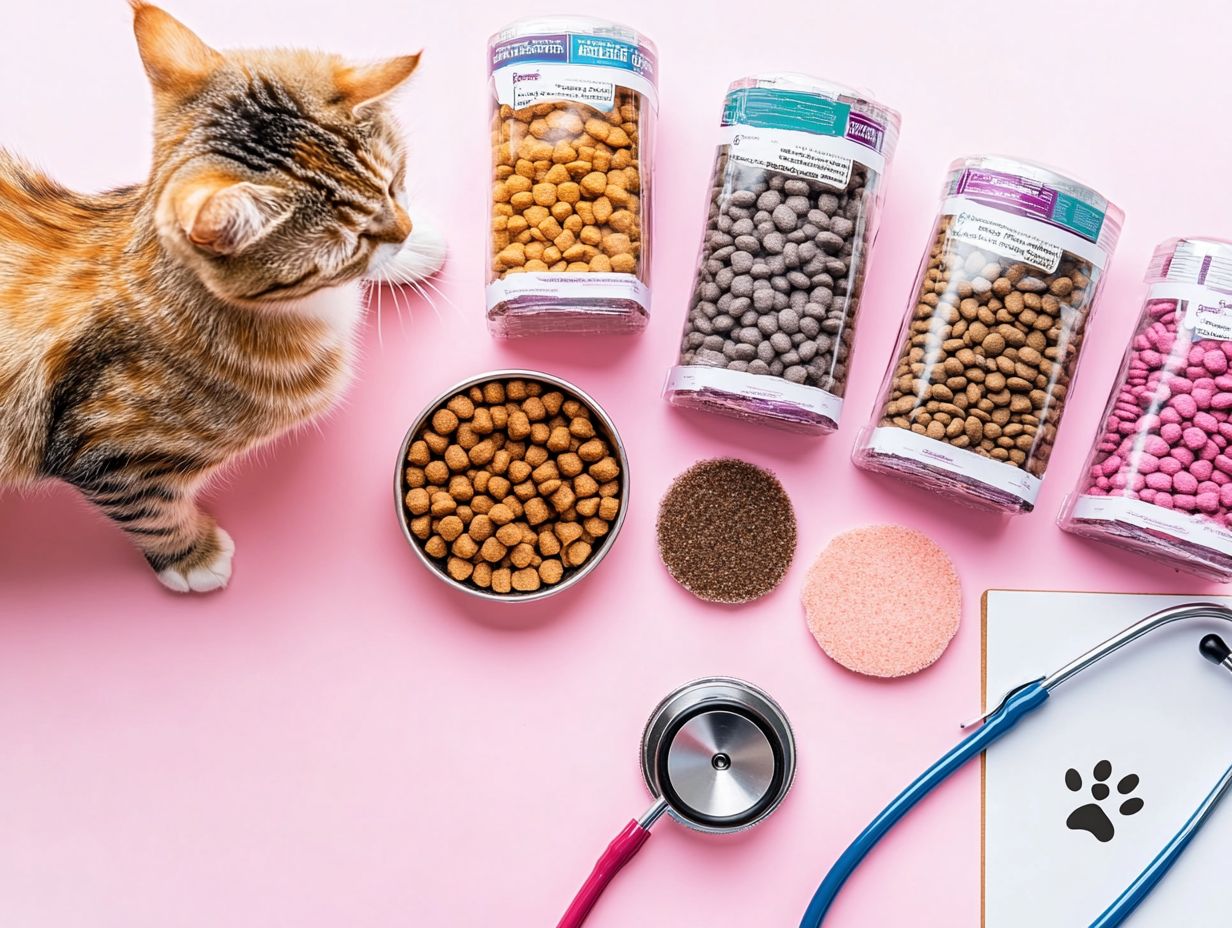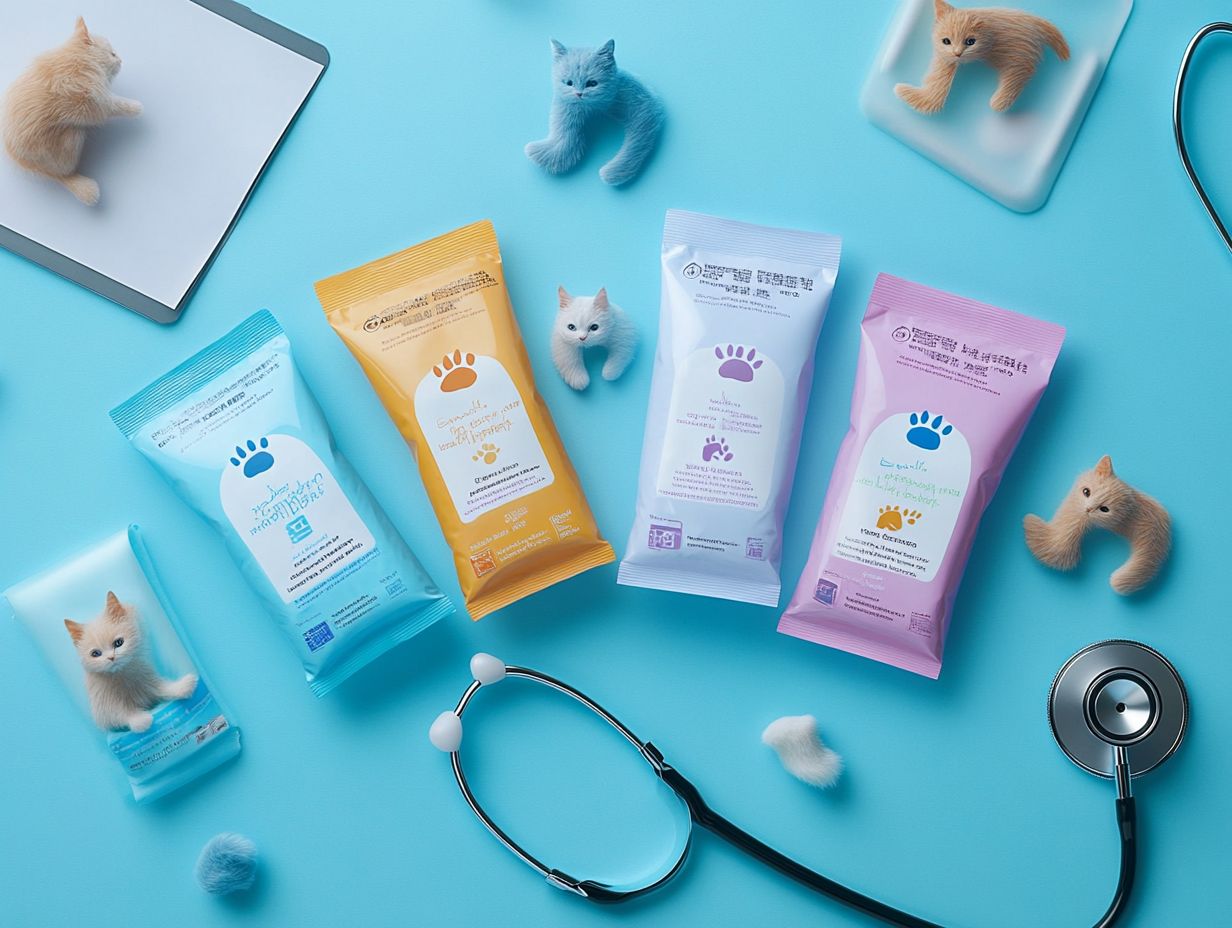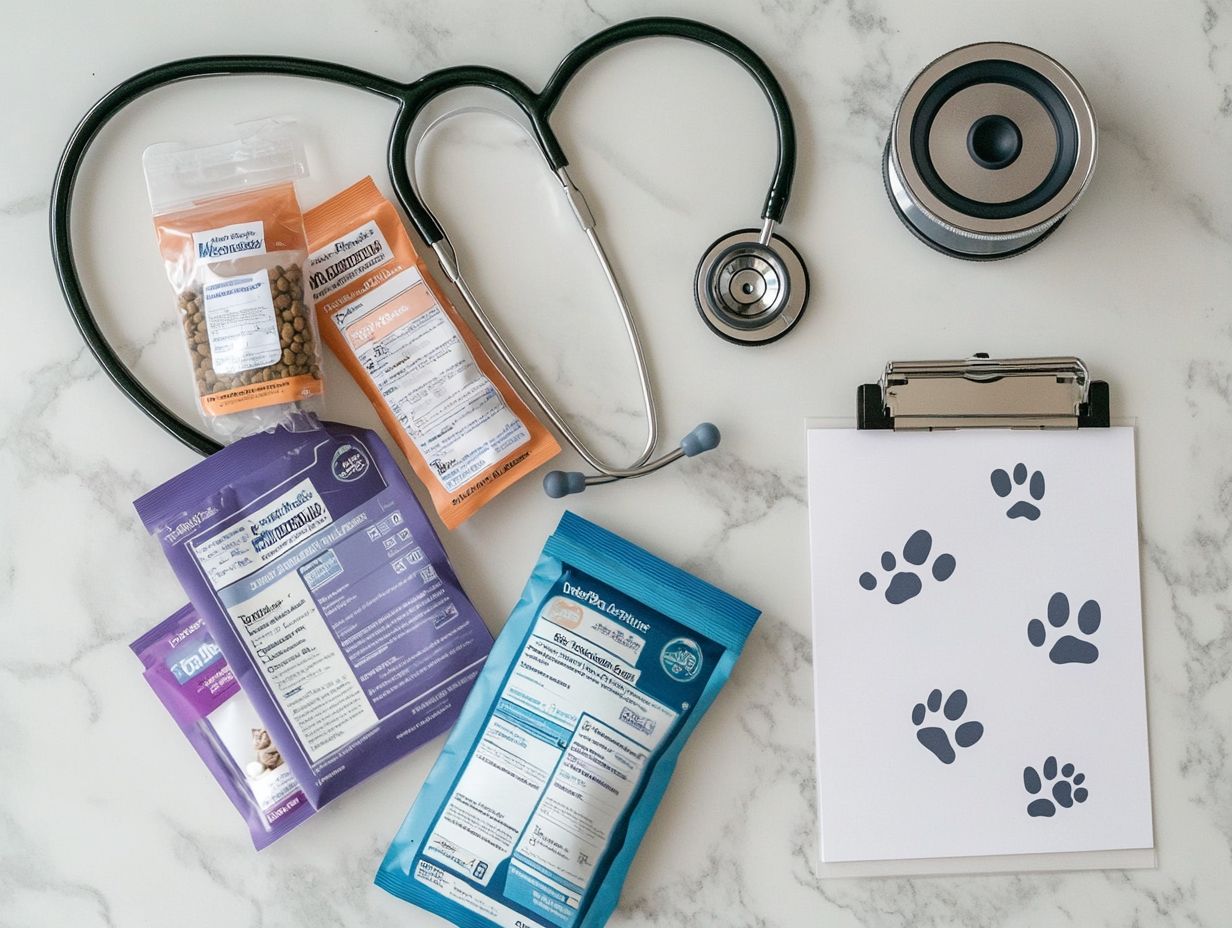Prescription cat food is specifically formulated to address various health issues in felines, making it an essential tool for cat owners aiming to improve their cat’s well-being and health. Before prescribing cat food, veterinary professionals conduct health assessments to tailor diets based on individual cat needs.
Whether your furry friend is dealing with chronic conditions or requires weight management, understanding the benefits, essential nutrients, and potential side effects of these specialized diets is crucial. It’s important to ensure that all claims regarding health benefits and side effects are supported by current veterinary research or authoritative guidelines, such as those from AAFCO or WSAVA.
This article explores the reasons for prescribing cat food, highlights its advantages, discusses possible downsides, and reviews the top brands recommended by veterinarians. In addition, it delves into the differences between wet food and dry food, feeding recommendations, and the importance of proper food storage and handling practices to prevent spoilage.
Ensure your kitty receives the best nutritional support, considering both wet vs dry food options to cater to their food preferences and encourage access to fresh water, especially for those on dry food diets!
Key Takeaways:

What Is Prescription Cat Food?
Prescription cat food is specifically designed to address the unique health needs of cats with certain medical conditions. Formulated under the guidance of veterinary nutritionists, it meets the AAFCO standards for nutritional adequacy and includes special formulas for specific health needs.
These foods generally contain higher-quality ingredients tailored to specific dietary requirements, ensuring that cats receive the necessary nutrition. Prescription cat food is often used alongside medication and other treatment modalities to help manage health issues such as food allergies, urinary tract problems, kidney disorders, obesity, diabetes, and digestive health concerns. Additionally, these diets often include antioxidants and probiotics to boost immune support. For more information, check out the Top 7 Prescription Cat Food Brands: Veterinarian Reviews.
What Are The Reasons For Prescribing Cat Food?
Veterinary professionals prescribe cat food for various reasons, primarily based on the individual health needs of cats and specific dietary considerations. Common health issues such as food sensitivities, allergies, obesity, diabetes, and other dietary needs often necessitate these specialized diets. Each formula is designed to address the unique nutritional requirements associated with a cat’s condition, ensuring optimal health and well-being.
For instance, cats with food allergies may benefit from novel protein sources that minimize adverse reactions, while those struggling with obesity require controlled calorie levels to promote healthy weight loss. Additionally, potential nutritional deficiencies can arise from various diets, including raw and vegan options, which should be taken into account.
Cat owners have a responsibility to consult with veterinary specialists to ensure that their pets’ dietary needs are effectively met, thereby enhancing their quality of life through tailored nutrition.
What Are The Benefits Of Prescription Cat Food?
Prescription cat food offers several benefits, including the management of chronic health conditions, balanced nutrition, and support for weight management in cats. It is formulated with specific nutritional profiles to promote optimal health.
This specialized food can aid in digestive and urinary health, as well as provide essential nutrients tailored to a cat’s unique metabolism. For example, diets for kidney disease may include limited protein and phosphorus, while diets for diabetes often contain controlled carbohydrates. Additionally, the inclusion of antioxidants and probiotics can support immune health. Therefore, prescription cat food serves not only as a dietary solution but also as a crucial component of a comprehensive veterinary care regimen.
1. Helps Manage Chronic Health Conditions
Prescription cat food is often essential for treating chronic health conditions such as diabetes, kidney disease, and obesity, as it provides specialized nutrition that aids in the recovery and overall health of sick cats. These specialized diets are formulated by veterinary nutritionists who understand the specific needs of cats with particular diseases.
Using animal-source proteins and essential fatty acids enhances the nutritional properties necessary to address deficiencies or imbalances caused by chronic illnesses. For example, diets rich in omega-3 fatty acids can help reduce inflammation in cats with kidney disease, according to current veterinary research and recommendations from AAFCO and WSAVA, while soluble fiber is crucial for managing blood sugar levels in diabetic cats.
The right prescription food can significantly improve quality of life and support long-term health, thanks to its high-quality ingredients and diverse nutrients. Additionally, the inclusion of prebiotics can aid in nutrient delivery and digestion.
2. Provides Balanced Nutrition
Prescription cat food, formulated to meet high AAFCO standards for nutritional adequacy, provides balanced nutrition that ensures cats receive all the essential nutrients necessary for optimal health. This specialized food addresses the unique dietary needs of many cats, which can arise from health issues, age, or lifestyle factors. Essential nutrients for cats include taurine, arachidonic acid, and various vitamins.
By offering balanced nutrition, pet owners can help manage conditions such as obesity, kidney disease, and food allergies. Prescription diets often incorporate high-quality ingredients like real chicken, salmon, and a limited selection of safe fruits and vegetables, as cats primarily require animal proteins to avoid nutritional deficiencies.
These ingredients supply vital proteins, omega fatty acids, vitamins, and minerals, which not only support a cat’s immune system but also promote overall health—key indicators of their vitality and longevity. Additionally, these diets often include antioxidants for enhanced immune support and probiotics for digestive health.
3. May Help with Weight Management

Weight management is crucial for many cats, especially those at risk of obesity, and prescription cat food provides specialized formulas that address this important aspect of feline health. These tailored diets contain a carefully balanced mix of proteins, fats, and carbohydrates that support optimal feline metabolism, ensuring that energy levels are sustained without promoting excessive weight gain.
Key ingredients, such as high-quality proteins, encourage the maintenance of lean muscle, while fiber enhances satiety, reducing the urge for frequent snacking. Additionally, a lower fat content—typically around 10-15%—helps manage calorie intake without compromising the cat’s nutritional needs. Considering moisture content in wet food can also support better hydration and overall health. When choosing between wet and dry prescription diets, consider hydration needs versus dental health benefits. For more information on choosing the best food for your feline friend, check out the Top 7 Prescription Cat Food Brands: Veterinarian Reviews.
By focusing on these dietary considerations, pet owners can assist their feline companions in achieving a healthier weight, ultimately enhancing their overall vitality and quality of life.
What Are The Potential Side Effects Of Prescription Cat Food?
Prescription cat food is formulated to enhance health; however, cat owners should be mindful of potential side effects, including digestive upset, food aversion, and allergic reactions. Symptoms of digestive upset may include vomiting and diarrhea.
1. Digestive Upset
Digestive upset is a common side effect when switching to prescription cat food, often resulting from a sudden change in dietary profiles and ingredient quality. To minimize the risk of digestive issues during this transition, it is essential to implement gradual changes.
One effective approach is to gradually introduce the new food by mixing it with the old diet over several days to a week. This method allows the cat’s digestive system to adjust without being overwhelmed. It is important to consider the nutritional profiles of both the current and new foods to ensure they complement each other.
Additionally, consulting with veterinary professionals can provide personalized guidance and help address any specific needs.
2. Food Aversion
Food aversion in cats can sometimes result from their resistance to prescription diets, particularly if they are accustomed to more palatable options. Several factors can contribute to this resistance, including the flavor and texture of the new food, pre-existing health issues, and learned aversions to specific smells or tastes. Conducting taste tests or trials before committing to a new diet can help ease the transition.
To promote better acceptance of necessary diets, pet owners should consider gradually introducing small amounts of the prescription food into their cats’ regular meals. Utilizing AAFCO-compliant diets made from high-quality ingredients that appeal to cats is essential. Additionally, maintaining consistent feeding schedules and following dietary transitions can foster better eating habits and allow cats time to adjust to the new diet.
3. Allergic Reactions
Cats can occasionally experience allergic reactions to certain ingredients in prescription cat food, making it essential for owners to read the ingredient list carefully. Common allergens may include dairy, beef, chicken, and fish. Recognizing how to identify these reactions can greatly enhance a cat’s quality of life.
Owners should be on the lookout for signs of allergic reactions, such as itching, swelling, gastrointestinal upset, or skin irritation, as these are the most common indicators of a food allergy. If any of these signs occur, it is vital to contact a veterinarian immediately to address the issue.
Understanding ingredient quality is crucial; feeding nutritionally complete foods made from easily identifiable ingredients can significantly reduce the risk of adverse reactions. For insights into the best options, check out the Top 7 Prescription Cat Food Brands: Veterinarian Reviews. Owning a cat is a significant responsibility, and being attentive to even minor changes in behavior or health can help owners better support their cats’ health and nutritional needs. Following proper feeding tips and keeping track of their cat’s dietary preferences can further enhance their well-being.
What Are The Top Prescription Cat Food Brands?
The brands that produce the best cat foods with the highest quality standards, adhering to AAFCO standards and recommended by veterinary nutritionists, include:
- Hill’s Prescription Diet
- Royal Canin Veterinary Diet
- Purina Pro Plan Veterinary Diets
1. Hill’s Prescription Diet (Vet Recommended)

Hill’s Prescription Diet is a highly regarded brand that offers specialized formulas to support cats with various health issues, including weight management and digestive health. Their wet food and dry food options adhere to nutritional adequacy guidelines set by AAFCO. Along with these, Hill’s provides a diverse range of products designed to address more serious concerns such as kidney function, urinary care, and allergies.
Each diet is formulated with specific ingredients and nutritional profiles to ensure optimal support for overall health and well-being. There are even options available for cats with kidney disease, featuring tailored nutrient levels to promote renal health, and for diabetes, which require precise carbohydrate management.
Additionally, some formulas are rich in antioxidants to bolster immune system support, ensuring that every cat receives the appropriate care for their unique health needs.
2. Royal Canin Veterinary Diet
Royal Canin Veterinary Diet is renowned for its tailored nutrition and specialized formulas that address the unique dietary needs of cats with specific medical conditions. This product line features meticulously crafted formulations for a wide range of requirements, including weight management, digestive health, and renal support.
Each formulation incorporates specific nutrients known to promote optimal health, thereby mitigating the severity of conditions such as urinary sensitivities and skin irritations. By utilizing high-quality ingredients and easily digestible proteins, these diets enhance an animal’s overall vitality and quality of life.
This commitment to specialized nutrition reflects a profound understanding of the complexities of feline health, ensuring that each cat receives exceptional care.
3. Purina Pro Plan Veterinary Diets
Purina Pro Plan Veterinary Diets is a brand of prescription cat foods renowned for its effective delivery of nutrients and its ability to address various health needs in cats. The brand offers specialized diets for obesity control, renal care, and gastrointestinal health, among others, enabling cat owners to select nutritional options that specifically cater to their pet’s medical conditions.
Proper food storage and handling practices are essential to prevent spoilage. Owners should store cat food in a cool, dry place and check for signs of spoilage, such as unusual odors or discoloration. Always adhere to the expiration dates provided.
It’s important to note that while raw or homemade diets may offer potential benefits, they also pose risks. Owners should consult with a veterinarian before making any significant dietary changes to ensure that their cat’s nutritional needs are met.
Avoid using ingredients toxic to cats, such as onions, garlic, and chocolate, as these can pose serious health risks. Ensuring a balanced diet that adheres to AAFCO guidelines will support your cat’s long-term health.
When managing weight, it’s crucial to align with recent feline obesity guidelines, focusing on portion control and monitoring body condition scores to ensure a healthy weight for your cat.
While sustainability may be a concern, the primary focus should remain on the health and nutritional needs of the cat, ensuring that ethical discussions do not overshadow this aspect.
For example, the Hydrolyzed Protein diet is ideal for cats with food hypersensitivities or allergies. This diet provides essential nutrients such as amino acids and fatty acids, which are crucial for skin health and immune function, without the risk of triggering adverse reactions. Meanwhile, the Weight Management diet aids in weight loss and the maintenance of a healthy body weight by controlling calorie intake while supplying necessary protein and fiber for overall health. Understanding the nutrient profiles in these diets can help owners make informed choices for their feline friends.
4. Iams Veterinary Formula
Iams Veterinary Formula provides balanced nutrition through prescription cat food designed for cats with specific health needs. These specialized dietary profiles create tailored formulas for cats experiencing urinary tract issues, digestive sensitivities, and weight management concerns. Each diet is formulated to include specific nutrients, like urinary acidifiers for urinary health and prebiotics for digestive support, ensuring alignment with the latest veterinary guidelines.
Each recipe is crafted with a carefully selected range of ingredients to ensure optimal well-being, catering even to the pickiest eaters. With higher protein levels for active cats and lower fat content for those prone to obesity, Iams enables pet owners to make informed choices that support their cats’ unique health needs, promoting long and healthy lives.
5. Blue Buffalo Natural Veterinary Diet
Blue Buffalo Natural Veterinary Diet offers high-quality, natural ingredients in its prescription cat food formulations, designed to meet the health requirements of felines with specific dietary issues. These include protein sourced from real meat and wholesome vegetables that address the unique nutritional needs of cats with medical conditions while supporting their overall health.
The high-protein, micronutrient-rich prescription diets include vitamins such as A, E, and C, which aim to boost immunity, improve digestion, and promote healthy skin and coats. Since many cats can be sensitive to artificial additives and fillers, using high-quality food ensures they receive a balanced diet with minimal potential allergens, helping to keep them healthy and happy.
6. Natural Balance Limited Ingredient Diets
Natural Balance Limited Ingredient Diets are specifically designed for cats with food allergies and sensitivities, utilizing a restricted ingredient profile to minimize adverse reactions. It is important for owners to consult with a veterinarian before starting an LID to avoid potential nutrient deficiencies. By focusing on a small number of key protein sources and a limited selection of highly digestible carbohydrates, this type of diet reduces the risk of adverse reactions and helps owners and veterinarians identify which ingredients the cat may be sensitive to.
The restricted ingredient profile allows for the elimination of various ingredients within the same food, aiding in the determination of specific sensitivities. In an LID diet, the ingredients are high-quality, whole food products that provide essential nutrients while avoiding common allergens such as grains, dairy, and certain meats.
This approach leads to improved digestive health and coat quality, offering relief for cats experiencing symptoms like itchy skin or digestive upset. Monitoring a cat’s health while on an LID can help owners identify the effectiveness of the diet.
7. Wellness CORE Natural Grain-Free Dry Cat Food

Wellness CORE Natural Grain-Free Dry Cat Food is an excellent choice for cats requiring a prescription diet, as it emphasizes high-quality ingredients and animal-based protein sources for overall wellness, offering benefits like hairball control and moisture content regulation, which aids hydration and supports urinary health.
This carefully formulated food is rich in protein, promoting muscle repair and growth, and is also packed with omega fatty acids and antioxidants. By utilizing lean protein sources, it helps maintain a cat’s energy levels and supports healthy weight management, thereby preventing obesity.
The grain-free formula means less filler and facilitates easier digestion, even for the most sensitive stomachs. This optimal nutrition contributes to a stronger immune system and enhances coat quality, promoting overall feline wellness.
Frequently Asked Questions
1. What are the top 7 prescription cat food brands recommended by veterinarians?
The top 7 prescription cat food brands recommended by veterinarians include:
- Royal Canin
- Hills Prescription Diet
- Purina Pro Plan Veterinary Diets
- Iams Veterinary Formula
- Royal Canin Veterinary Diet
- Purina Veterinary Diets
- Hill’s Science Diet
These brands are considered the best for cats with special dietary needs as they adhere to current nutritional standards and veterinary recommendations, ensuring that they provide balanced nutrition specifically developed for various medical conditions.
2. Why are these brands considered the best for cats with special dietary needs?
Each brand offers formulas that comply with AAFCO guidelines, ensuring they meet the specific health requirements of cats. It is important for owners to consider food storage and handling practices to maintain nutritional integrity and safety. Additionally, while ethical and sustainability concerns are becoming more prevalent, the main priority should always remain the health needs of the cat.
When considering different diets, including raw and homemade options, it’s crucial to consult with a veterinarian to ensure they meet AAFCO standards and do not pose risks to a cat’s health.
These brands are specifically formulated to meet the unique nutritional requirements of cats with health conditions such as urinary tract issues, food allergies, and weight management. They are backed by extensive research and are recommended by veterinarians for their effectiveness in improving and maintaining a cat’s health. It’s important to consult veterinary sources for up-to-date information regarding these diets.
3. Can I purchase prescription cat food without a veterinarian’s recommendation?
No, prescription cat food can only be obtained with a veterinarian’s approval. These specialized diets require a prescription because they are formulated to address specific health issues and may not be suitable for all cats. A veterinarian will assess your cat’s condition and recommend the appropriate diet. Ongoing consultation is essential for monitoring your cat’s health after any dietary changes.
4. Are these prescription cat food brands more expensive than regular cat food?
Yes, these brands may be more expensive than regular cat food due to their specialized formulas and ingredients. However, investing in your cat’s health can potentially save you money in the long run by avoiding expensive treatments for health issues that can arise from a poor diet. Proper weight management strategies, such as portion control and regular exercise, are also vital.
5. Can I switch my cat’s food to one of these prescription brands without consulting a veterinarian?
No, it is crucial to consult with a veterinarian before making any changes to your cat’s diet. These prescription diets are not suitable for all cats and may not provide the necessary nutrients for your cat’s specific health condition. A veterinarian can also guide you on the importance of a balanced diet, emphasizing the need for animal-source proteins and essential amino acids like taurine.
6. Are there any alternative options to prescription cat food recommended by veterinarians?
Yes, there are alternative options such as limited ingredient diets or homemade diets that may be recommended by a veterinarian for certain health conditions. However, these options should also be discussed with a veterinarian to ensure they meet your cat’s nutritional needs. It’s important to be aware of the potential risks or deficiencies that could arise from improperly formulated diets.
7. Special Dietary Needs
Different life stages or conditions, such as senior cats or those with diabetes, may require unique dietary considerations. Prescription diets are available that cater to these specific needs, and a veterinarian can provide the best recommendations based on your cat’s health status.
8. Food Safety
When handling prescription diets, ensure proper storage to prevent spoilage. Always check for signs of spoilage and discard any food that appears off to maintain your cat’s health.
9. Ethical Considerations
Some veterinary professionals consider ethical and sustainability concerns regarding cat diets. However, it is essential to prioritize your cat’s health when making dietary choices.